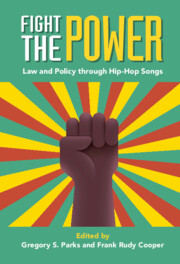Book contents
- Fight the Power
- Fight the Power
- Copyright page
- Dedication
- Contents
- Contributors
- Acknowledgments
- Introduction Still Fighting the Power
- Part I Policing
- Part II Imprisonment
- Part III Genders
- 8 Roxanne Shanté’s “Independent Woman”: Making Space for Women in Hip-Hop
- 9 From the 1930s to the 2020s: What Ice Cube’s Song “Endangered Species” Meant for Four Generations of Black Males
- 10 The Master’s Tools Will Not Dismantle the Master’s House: Hip-Hop, Young M.A., and Gender Norms
- Part IV Protests
- Index
8 - Roxanne Shanté’s “Independent Woman”: Making Space for Women in Hip-Hop
from Part III - Genders
Published online by Cambridge University Press: 20 January 2022
- Fight the Power
- Fight the Power
- Copyright page
- Dedication
- Contents
- Contributors
- Acknowledgments
- Introduction Still Fighting the Power
- Part I Policing
- Part II Imprisonment
- Part III Genders
- 8 Roxanne Shanté’s “Independent Woman”: Making Space for Women in Hip-Hop
- 9 From the 1930s to the 2020s: What Ice Cube’s Song “Endangered Species” Meant for Four Generations of Black Males
- 10 The Master’s Tools Will Not Dismantle the Master’s House: Hip-Hop, Young M.A., and Gender Norms
- Part IV Protests
- Index
Summary
Lolita Buckner Innis looks at Roxanne Shante’s 1989 song, “Independent Woman,” to reveal its trenchant critique of then prevailing limitations on the social roles of black women. In “Independent Woman,” Shanté speaks to black women who believe that success comes only from a man. During this era black women, in particular, faced difficult choices since neither law nor society had historically provided them with the opportunity to embrace personal domesticity or their roles as helpmates to black men. Shanté deploys one of second wave white feminism’s unofficial rallying cries, “You’ve come a long way baby,” with an ironic twist, noting that black women are “way behind.” Black women’s desire for helpmate status to black men was sometimes corrupted into a desire for self-abnegation of the lowest form–acting as the “loyal ho,” the black woman who sells herself to please a man. As the lyrics of “Independent Woman” describe, these “sales” occurred both outside of the law, when “bad” women worked as actual prostitutes, and within the law, where “good” women exchanged personal self-regard or ambition in the quest for a male-dominated domesticity.
Keywords
- Type
- Chapter
- Information
- Fight the PowerLaw and Policy through Hip-Hop Songs, pp. 175 - 186Publisher: Cambridge University PressPrint publication year: 2022



